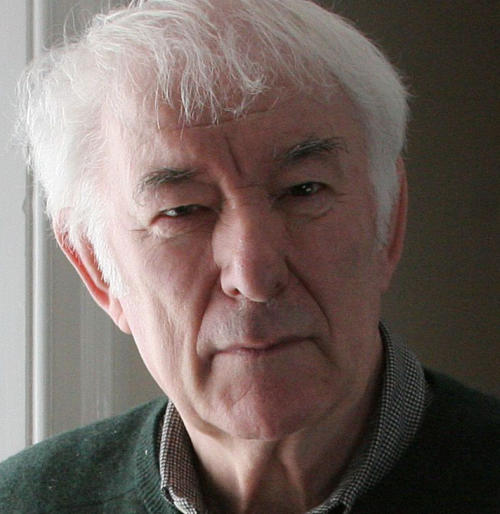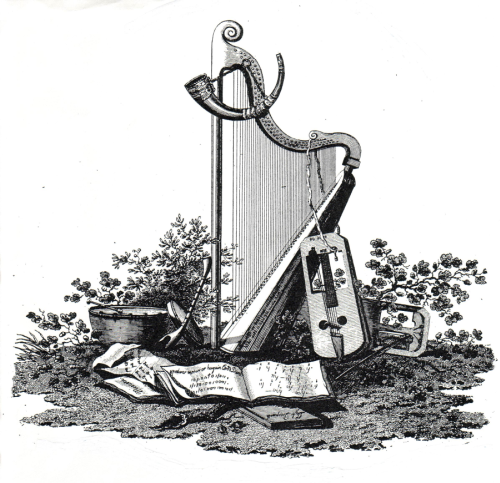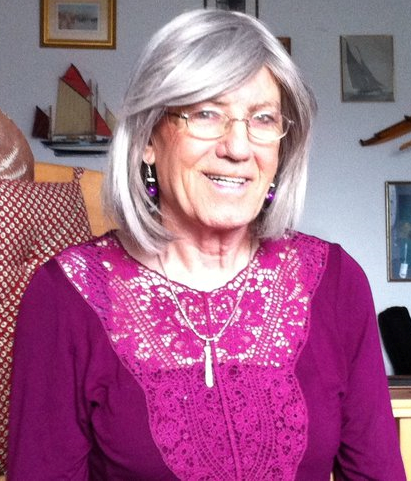 Nobel Laureate
Seamus
Heaney
has been laid to rest
in his native Bellaghy in County Londonderry. Acclaimed by many as the
best Irish poet since Yeats, the 74-year-old died in a Dublin hospital
on Friday, August 31.
Nobel Laureate
Seamus
Heaney
has been laid to rest
in his native Bellaghy in County Londonderry. Acclaimed by many as the
best Irish poet since Yeats, the 74-year-old died in a Dublin hospital
on Friday, August 31.
A funeral service
was held earlier at the Church of the Sacred Heart, in Donnybrook,
County Dublin. Northern Ireland's Deputy First Minister Martin
McGuinness, Sinn Féin President Gerry Adams and the SDLP's John Hume
were among those who attended the burial. Mourners at the service in
Donnybrook included rock singer Bono, other members of U2, Irish Prime
Minister Enda Kenny and Irish President Michael D Higgins.
Hollywood actor
Stephen Rea, Paddy Moloney from the Chieftains, and singer-songwriter
Paul Brady were among a number of high-profile figures from the arts
world in the congregation. The mourners were led by the poet's widow,
Marie, and their three children, Christopher, Michael and Catherine
Ann.
The poet’s final
message to Marie, minutes before died, were in his beloved Latin. It
read: “Noli timere - don't be afraid."
His brother, Pat
Heaney, niece Sarah Heaney and his brother-in-law Barry Devlin, from
the Irish Celtic folk-rock band Horslips, were among the family
members who took part in the ceremony. Barry praised: “The spirit of
Christian optimism which, it seems to me, breathes in much of the work
of Seamus Heaney and which I believe to be his inheritance from our
troubled past."
He described the
poet as a "brilliant literary critic" and an "articulator of the years
of pain" in his native Northern Ireland. He added he was: “A great
democrat who could speak to the King of Sweden, an Oxford Don or a
south Derry neighbour".
Seamus Heaney’s
poem ‘The Given Note’ was read by his fellow poet and publisher, Peter
Fallon:
“On the most
westerly Blasket
In a dry-stone hut
He got this air out
of the night.
Strange noises were
heard
By others who
followed, bits of a tune
Coming in on loud
weather
Though nothing like
melody.
He blamed their
fingers and ear
As unpractised,
their fiddling easy
For he had gone
alone into the island
And brought back
the whole thing.
The house throbbed
like his full violin.
So whether he calls
it spirit music
Or not, I don't
care. He took it
Out of wind off
mid-Atlantic.
Still he maintains,
from nowhere.
It comes off the
bow gravely,
Rephrases itself
into the air.”
Prominent Irish
traditional musician Liam O'Flynn played ‘Port na bPúcaí’ (Tune of the
Fairies) on the uilleann pipes. Mourners who lined the street outside
the church applauded as the poet's coffin was driven away, and books
of condolence were opened in Belfast and Dublin. Another opened at the
Guildhall in Derry in August.
A celebration of
the poet's life at Belfast's Lyric theatre on Saturday night was
packed to capacity as the audience was treated to poignant recitals of
his best-known works.
He was awarded the
Nobel Prize for Literature in 1995 "for works of lyrical beauty and
ethical depth, which exalt everyday miracles and the living past".
Over his long career, he was awarded numerous prizes and received many
honours for his work. The poet recently suffered from ill health; his
2010 poetry collection, The Human Chain, was written after he
suffered a stroke, and the central poem, ‘Miracle’, was directly
inspired by his illness.
Brought up a
Catholic, he wrote an epitaph in 1972 at the time of the Bloody Sunday
massacre in Derry. He sent it to Luke Kelly of The Dubliners, and
suggested the tune ‘The Boys of Mullaughawn’ - but Luke thought the
tune was too slow, and never used it. Twenty years later, it came to
light when Seamus sent it to the Guardian, and it was printed in the
paper:
“On a Wednesday
morning early I took the road to Derry
Along Glenshane and
Foreglen and the cold woods of Hillhead
A wet wind in the
hedges and a dark cloud on the mountain
And flags like
black frost mourning that the thirteen men were dead.
The Roe wept at
Dungiven and the Foyle cried out to heaven
Burntollet's old
wound opened and again the Bogside bled
By Shipkey Gate I
shivered and by Lone Moor I enquired
Where I might find
the coffins where the thirteen men lay dead.
My heart besieged
by anger, my mind a gap of danger,
I walked among
their old haunts, the home ground where they bled,
And in the dirt lay
justice like an acorn in the winter
Till its oak would
sprout in Derry where the thirteen men lay dead.”

Back to Top
Dave Bulmer,
Irish music accordionist extraordinaire, accompanist to John Doonan
and controversial owner of Celtic Music Distribution, died in his
sleep early in August. He was born in South Shields, but moved to
Harrogate, Yorkshire. He provoked a storm of protest when Bill Leader
sold him the rights to the Leader and Trailer catalogue; the Greenwich
Village label, who were distributing South Wales duo Calennig’s first
two albums, was among several labels that Celtic Music acquired.
But he declined to
release any of the Leader and Trailer catalogue or any of the labels
he had acquired. These included Lal and Mike Waterson’s legendary
Bright Phoebus, many traditional singers and the recording catalogue
of Dick Gaughan and Nic Jones, among others. Moreover, Nic had been
severely injured in a road crash, and at that time it was thought that
he could never perform again; his royalties on the Trailer albums were
a much-needed necessity. Celtic Music’s reputation was shattered by
hundreds of threads from angry musicians, recording engineers and the
public, posted to Mudcat and other discussion websites.
But his tiny acts
of compassion went unnoticed; in later years, after ex-BBC engineer
and Forest Tracks founder Andy Jackson contacted him, he donated the
two Calennig albums free of charge to help out musician Mick Tems, now
editor of FolkWales Online Magazine, whose life had been shattered by
a severe stroke.

Back to Top
Well-known dance
caller par excellence and accordionist Bobbie
Ritchie, wife of melodeon player Simon Ritchie, died in
hospital in August after a long illness. She and Simon lived in
Thaxted, Essex.

Back to Top
Kongar-ol Ondar, an
internationally renowned master of Tuvan throat singing, the Central
Asian vocal art in which a singer produces two or more notes
simultaneously - and which to the uninitiated sounds like the
bewitching, remarkably harmonious marriage of a vacuum cleaner and a
bumblebee - died on July 25 of complications after emergency surgery
for a brain hemorrhage in Kyzyl, Tuva's capital, aged 51.
A region in
southern Siberia just north of Mongolia, Tuva was an independent
country from 1921 until 1944, when it was annexed by the Soviet Union.
The region, which has a population of about 300,000, is now part of
the Russian Federation.
Small, round and
beatific, he was a superstar in Tuva - "like John F. Kennedy, Elvis
Presley and Michael Jordan kind of rolled into one," in the words of
Genghis Blues (1999), an Oscar-nominated documentary about
throat singing in which he figures prominently.
His reach extended
far beyond the region, performing throughout Europe and the United
States, including at the Japan Society in New York, the Kennedy Center
in Washington and the Grand Ole Opry in Nashville. He made a memorable
appearance, in full traditional regalia, on The Late Show With David
Letterman; sang at three Rose Parades in Pasadena, California, and
carried the torch through Georgia for the 1996 Olympics in Atlanta.
Known for his captivating stage presence, he was nicknamed "the
Groovin' Tuvan" by the Western musicians with whom he played.
Kongar-ol, also a
former member of the Tuvan parliament, had a troubled youth. As a boy,
he experienced domestic violence firsthand. To escape his
step-father’s beatings, he endured nights alone in the sub-zero Tuvan
winter, and he spent four years in brutal Soviet penal colonies in for
a crime he did not commit.
He performed or
recorded with Frank Zappa, the Kronos Quartet, Willie Nelson, Mickey
Hart and the banjo virtuoso Béla Fleck. At the same time, through his
recording, performance and teaching of classic Tuvan throat singing,
he helped revitalise a tradition that had been largely extinguished
during the Soviet era. “The whole Tuvan culture was disappearing
because it was outmoded under the Soviet system," said Ralph Leighton,
the author of Tuva or Bust! Richard Feynman's Last Journey.
"They were supposed to build the new Modern Soviet Man, and therefore
places like Tuva, which practices shamanism and Buddhism, were seen as
backward."
Throat singing is
practiced in only a few parts of the world, mostly in Asia. The Tuvan
variety, known as khoomei, is the most famous of all. Whenever someone
sings a note, the column of air in the throat vibrates, producing both
a fundamental tone and a series of higher pitches. In conventional
singing, the overtones are largely inaudible, manifesting themselves
as timbre. In throat singing, through careful manipulation of the
mouth and throat, a vocalist can render certain overtones audible,
resulting in two, three and even four pitches sounding at a time.
Properly sung, khoomei sounds as though the singer has swallowed a set
of bagpipes, with a low drone and a high melody issuing simultaneously
from the same mouth.
Khoomei lyrics, in
Tuvan (a language in the same family as Turkish), range over nature,
horses and love. "We're imitating what's around us, the birds, the
mountains, the snow, the rivers," Kongar-ol told The New York Times in
1999. "We sing sad songs, when we reveal what's in our soul. We sing
about love. Without love, what is life?"
He typically
performed in traditional dress - peaked silk hat, flowing silk robe
and boots with upturned toes. So attired, he accompanied Genghis
Blues director Roko Belic to the Academy Awards ceremony in 2000
and actually sang for actress-comedian Joan Rivers.
Kongar-ol was named
a People's Artist of Tuva and a National Artist of Russia, and he gave
command performances before the three men - Boris Yeltsin, Vladimir
Putin and Dmitri Medvedev - who have held the Russian presidency since
the break-up of the Soviet Union.
In 1994, singing
for Mr. Yeltsin, he experienced a moment of panic. "Suddenly Boris
Nikolayevich jumps off the chair and runs up to me," Kongar-ol said.
"I am not a big guy, but there was this big president hanging over
me."
But Mr. Yeltsin, it
transpired, only wanted to peer into his mouth. He was looking for a
hidden device of some kind, which, he felt certain, was letting
Kongar-ol make those remarkable sounds.

Back to Top
Canadian
Willie Dunn, film-maker, folk
musician, playwright and politician died on August 5. He was born in
Montreal, of mixed Mi'kmaq and Scottish/Irish background. He often
highlighted aboriginal issues in his work. The Ballad of Crowfoot is
about the inhumane and unjust colonial treatment of aboriginal
Canadians, as well as their taking charge of their destiny and
becoming politically active. One of the first National Films Board
products directed by an aboriginal film-maker, the film received
several awards including a Gold Hugo for best short film at the 1969
Chicago International Film Festival.

Back to Top
Prolific
singer-songwriter Gary Shearston
passed away on July 1 after suffering a stroke at his home near
Tenterfield, New South Wales, Australia at the age of 74. He recorded
12 albums and two double-CDs in a 50-year career, which had critics
enthusing: "The word 'legend' is used freely in the music world, but
few could be more entitled to its use than Gary Shearston"; and “Songs
that feed the soul, challenge the mind and do the heart all power of
good."
In recent years, he
had an extraordinary burst of creativity; even in his last days, he
was putting the finishing touches to a new collection of songs, some
of which will be released soon.
Gary sang songs of
peace, social justice and love, with a background of the Australian
landscape he loved. Over the years, his music absorbed and adapted a
diverse range of elements, including Australian aboriginal and West
Indian reggae (before either was popular with mainstream western
audiences.) He wrote songs with influences that ranged from Irish
traditional to Japanese, and released an album with jazz arrangements
that perplexed his folkie and pop music fans.
In his fifties, an
age when he might have started taking it easier, Gary followed his
faith and became a hard-working grass-roots Christian minister in
rural New South Wales. When he finally retired in 2007, he again threw
himself into songwriting. A celebration of the life and music of the
iconic Australian folksinger was held in Tenterfield, and many of
Gary’s songs were performed by his son Luke, his daughter Bonnie and
several folk artists.

Back to Top
 .
.
 Nobel Laureate
Nobel Laureate
 Legendary
traditional singer and musician Louisa Jo
Killen, formerly Louis Killen, died of lung cancer
complications in her home town of Gateshead on August 9. First to
break the sad news was John Roberts, who emigrated to America and sang
with Lou: "She was a dear friend for well over 40 years, and we sang
together as a trio with Tony Barrand in the 70s, as well as touring
again in the States in the 90s. Unsurpassed as a ballad singer, and a
major, major force in English traditional music, she will be missed."
Legendary
traditional singer and musician Louisa Jo
Killen, formerly Louis Killen, died of lung cancer
complications in her home town of Gateshead on August 9. First to
break the sad news was John Roberts, who emigrated to America and sang
with Lou: "She was a dear friend for well over 40 years, and we sang
together as a trio with Tony Barrand in the 70s, as well as touring
again in the States in the 90s. Unsurpassed as a ballad singer, and a
major, major force in English traditional music, she will be missed."